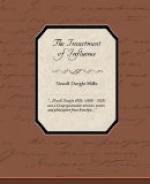The law of sacrifice is also industrial law. Great is the power of wealth. It buys comfort, it purchases travel, it secures instruments of culture for reason and taste, it is almoner of bounty for sympathy and kindness. Flowing through man’s life, it seems like unto some Nile flowing through Egypt with soft, irrigating flow, bearing man’s burdens upon its currents, giving food to bird and beast. But the story of each Peter Cooper, each Peabody, each Amos Lawrence, is the story of the ease of life lost to-day that the strength of life may be saved to-morrow. Each young merchant loved luxury and beauty, but in the interests of thrift he denied the eye its hunger, the taste its satisfaction. When pride asked for dress and show, the youth rebuked his vanity. When companions scoffed at the young merchant as a niggard he subdued his sensitiveness and inured himself to rigid economy. When increasing wealth began to lend influence, and society urged him to give his evenings to gayety, the young merchant denied the social instinct and gave his long winter evenings to broadening his knowledge and culture. Having lost the lower good, at last the time came when the American merchant and philanthropist had saved for himself universal fame. Having lost ease and self-indulgence during the first half of his life, he saved the higher ease and comfort for the second period of his career.
Similarly of the young men in Parliament who to-day have charge of the destinies of the English empire, it may be said that they have saved their lives, because the fathers lost theirs. One hundred years ago these fathers made exiles of themselves in the interests of their sons and daughters. The East India merchant exiled himself into the tropic land where heat and malaria made his skin as yellow as the gold he gained. Others braved the perils of the African forests, dared the dangers of Australian deserts, endured the rigor of the arctic cold. Losing the lower and present happiness, they saved the higher ease and comfort for their sons. The self-denial of yesterday brought the influence of to-day. Upon this principle God has organized the industrial world. Man must take his choice between ease and wealth, either may be his but not both.
Sacrifice is also the secret of beauty, culture and character. Selfishness eats sweetness from the singer’s voice as rust eats the edge of a sword. St. Cecilia refused to lend the divine touch to lips steeped in pleasure. He who sings for love of gold finds his voice becoming metallic. In art, also, Hitchcock has said: “When the brush grows voluptuous it falls like an angel from heaven.” Fra Angelico refuses an invitation to the Pitti palace, choosing rather his crust and pallet in the cell of the monastery. The artist gave his mornings to the poor, his evenings to his canvas. But when the painter had worn his life away in kindly deeds, men found that the light divine had been transferred




